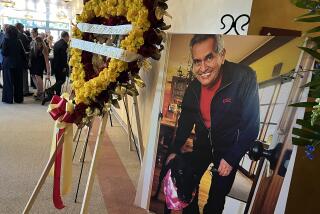Knowing When to Go
- Share via
Richard Alatorre has been a leader in Eastside, Los Angeles and statewide politics for many years. He has found and nurtured many young Latino talents who have gone on to higher office. He has fought for his constituents, been reelected several times in the state Assembly and served on the Los Angeles City Council for 13 years. But now his time should be up.
Alatorre, already under federal investigation for alleged violations including possible tax, banking and political corruption matters, has, according to a judicial finding, tested positive during a drug test for cocaine use. Superior Court Judge Henry W. Shatford, presiding over a bitter civil court custody case involving Alatorre’s niece, ordered the surprise drug test after several claims had been made about the councilman’s alleged abuse of cocaine.
The urine sample provided by Alatorre tested positive for cocaine. Alatorre immediately filed a motion challenging the methodology and results of the lab test. The councilman also raised questions about whether the lab was in fact an actual testing facility.
But it should be noted that the lab, Scientific America, has performed court-ordered drug tests for the past four years in Orange and Los Angeles counties. Reacting to the test result, Judge Shatford declared that “Richard Alatorre’s credibility has been totally shredded as to his profound declaration he has been clean from the use of cocaine. Court-ordered testing has proved to the contrary.”
Under direct questions on whether he had used cocaine, Alatorre first twice declared himself a recovering alcoholic before finally admitting that he had used cocaine as a state legislator and during his early years on the City Council. But he then claimed that he had not used cocaine in the past nine years.
Alatorre also finally admitted during testimony that he had a $13,200 loan (without a repayment plan) from the East Los Angeles Community Union (TELACU). At the time, Alatorre was also backing a TELACU team for a $65-million MTA subway contract and a TELACU partnership for a $2-million city development loan for a shopping center in his district. The loan and more are part of a wide-ranging federal investigation into Alatorre’s personal and public finances.
Alatorre testified that he had paid off part of the loan, then later said he hadn’t paid any of it, explaining that he had gotten “confused.” All the more reason for Alatorre to clear the cobwebs on his own time. The job of council member requires a constant exercise of judgment, which obviously would be impaired by cocaine use. Add to that, of course, that cocaine is an illegal substance.
Given the judge’s findings, Alatorre should resign, but we are under no illusion that he will do so. There is a natural resistance to an icon like Alatorre leaving office in controversy, especially when for many years he fought a good fight for underrepresented and underserved Latinos. But his constituents deserve focused and strong leadership. Alatorre is up for reelection in April. Certainly then, if not sooner, there should be a new council member for the 14th District.
More to Read
Sign up for Essential California
The most important California stories and recommendations in your inbox every morning.
You may occasionally receive promotional content from the Los Angeles Times.









